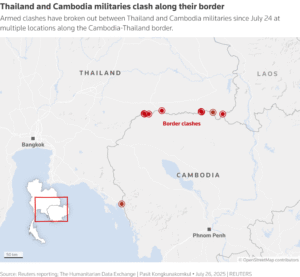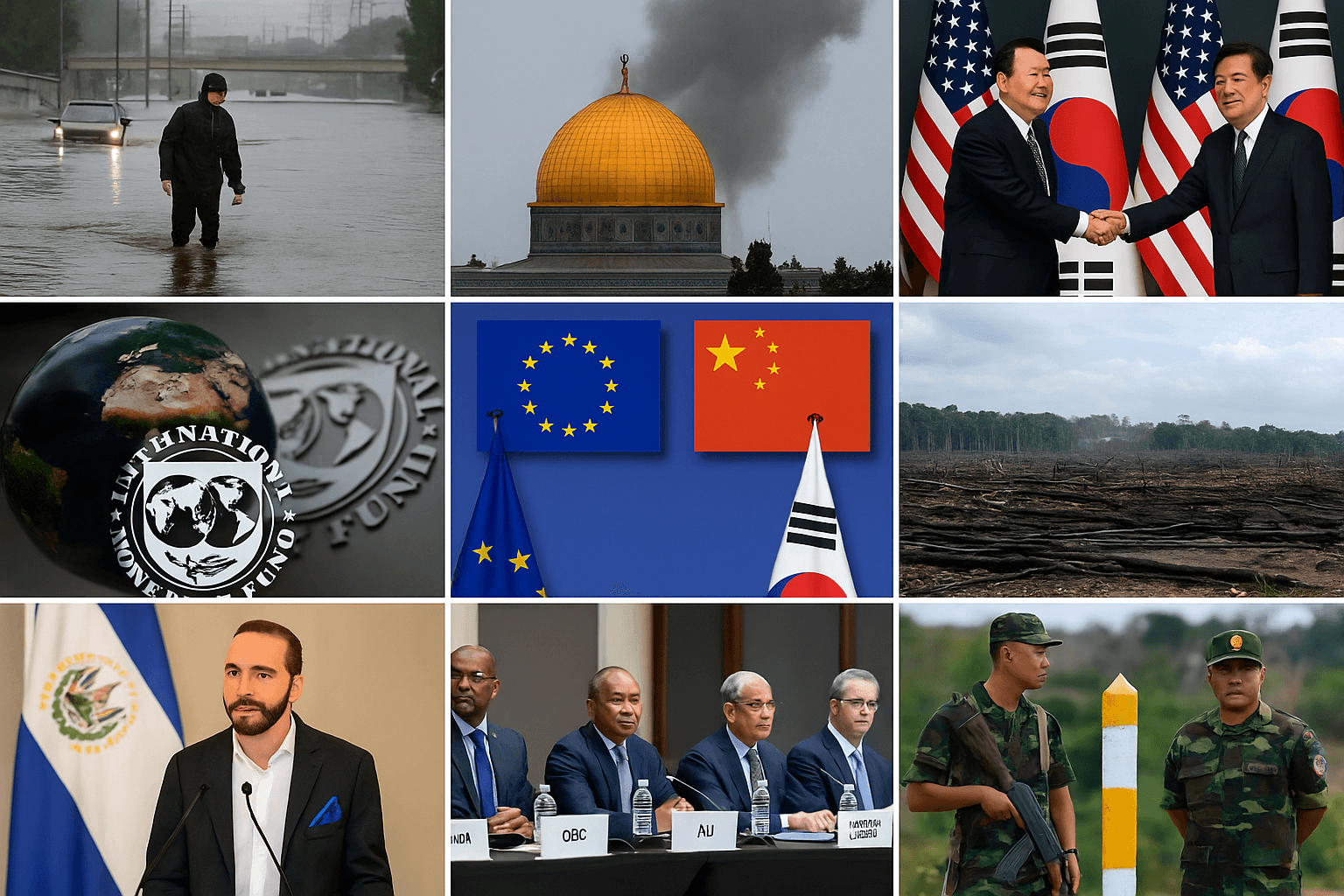1. Beijing Floods Kill Over 30 After Record Rain
Northern China’s capital Beijing was hit by catastrophic flooding after unprecedented heavy rain this week. In a few days, the city saw about a year’s worth of rain fall, submerging highways and villages. At least 30 people died and more than 80,000 residents had to be evacuated as bridges collapsed and power was cut off in rural areas reuters.com. Disaster experts note that such “trapped” downpours are becoming more common with climate change, straining even well-prepared cities. Cleanup and relief efforts are underway as authorities assess infrastructure damage and residents cope with this historic weather event reuters.com.
2. Israel Pauses Gaza Fighting for Aid Delivery
Amid growing international pressure, Israel announced it will halt military operations for 10 hours each day in parts of Gaza to allow humanitarian convoys into the enclave reuters.com. The temporary truce, beginning Sunday, is meant to aid starving civilians after months of siege and fighting. Jordan and the United Arab Emirates even began airdropping food supplies, while the U.S. president – on a trip to Scotland – warned that “a lot of people are starving” in Gaza reuters.com. Israel has also agreed to open more secure land routes for aid trucks, though officials stress the war will continue. Aid agencies say these steps are positive but insufficient, and they urge a broader ceasefire as Gazans face famine conditions reuters.comreuters.com.
3. South Korea and U.S. Seal $350 Billion Trade Deal
South Korea and the United States finalized a massive trade and investment agreement this week, defusing a months-long tariff standoff. Under the deal, the U.S. will cap tariffs on most Korean goods at 15%, down from as high as 25%, in exchange for roughly $350 billion of new South Korean investment in U.S. industries reuters.com. Korean officials said the pact “cleared up uncertainties” and put exporters on equal footing with rivals, while American leaders hailed the large investment commitments reuters.comreuters.com. The agreement follows trade threats – and earlier threats of 25% auto tariffs – between the two allies, and it now allows both sides to resume normal commerce. Analysts view the deal as a “worst-case avoided” outcome that stabilizes the U.S.-Korea trade relationship reuters.comreuters.com.
4. IMF Raises Global Growth Forecast, Warns of Tariff Risks
In new economic projections released at the IMF-World Bank meetings, the International Monetary Fund slightly upgraded its global growth outlook for 2025 to about 3.0% reuters.com. That’s marginally higher than earlier estimates but still below pre-pandemic norms. The IMF cautioned that U.S. President Trump’s tariffs and ongoing trade wars remain a major drag. Even a 10% tariff applied to almost all imports and threats of yet-higher duties have “hurt” growth, IMF economists warned reuters.com. In fact, the Fund noted that U.S. tariffs pushed up consumer prices and that stalled trade, not consumer spending, is currently limiting world growth. While the report leaves the door open for stronger growth, it underscored that “uncertainty remains high” as tit-for-tat tariffs between the U.S., China and others could tighten financial conditions reuters.comreuters.com.
5. China-EU Summit Focuses on Trade and Ukraine
European Union leaders will meet Chinese counterparts in Beijing next week amid cautious optimism and clear disagreements. In a preparatory video call, China’s commerce minister and the EU’s trade chief held a “candid, in-depth discussion” on how to boost economic cooperation reuters.com. However, just days before the summit the two sides remain at odds on key issues. Brussels plans to press Beijing on its export of rare earth minerals and on China’s handling of Russia’s war in Ukraine reuters.com. Beijing for its part raised objections about EU sanctions on Chinese banks linked to Russia reuters.com. Officials say both sides want smoother trade links, but significant policy rifts – from industrial subsidies to human rights – are likely to dominate the summit dialogue.reuters.com
6. Brazil Loosens Environmental Rules Ahead of Climate Summit
Less than four months before hosting COP30, Brazil’s Congress approved a bill this week that loosens key environmental licensing requirements. The new law lets many dams, roads and basic infrastructure projects proceed without the strict permits that were previously needed reuters.com. It won broad support from lawmakers allied with agribusiness, arguing that onerous permits were choking development. But environmentalists and even some members of President Lula’s government warned the change would do more harm than good reuters.com. Critics say Brazil is essentially undermining its own green credentials on the eve of the U.N. summit – “misaligning” itself with international standards even as it seeks to lead on climate issues reuters.comreuters.com. The vote adds to concerns about deforestation and drilling in the Amazon, despite Brazil’s pledge to make COP30 more inclusive for poorer nations.
7. UN Urgent Talks Over High Costs at COP30 Venue
The U.N. climate community is scrambling after diplomats warned that the venue costs for the upcoming COP30 summit in Belém, Brazil, could freeze out poorer nations. In an emergency meeting of the U.N. climate bureau, countries from Africa and beyond expressed alarm that hotel and accommodation rates in the Amazon host city have soared so high that many delegations fear they won’t afford to attend reuters.com. Brazil’s organizers have promised to address the problem by August 11, proposing measures such as cruise-ship hotels and extra housing. reuters.comreuters.com The pressure reflects a major worry: nearly every country needs to send climate negotiators, and any barriers to participation could undermine the summit’s legitimacy. The story is now dominating discussions ahead of the UNFCCC summit in November, highlighting tensions between rich and developing nations on climate diplomacy reuters.comreuters.com.
8. El Salvador Abolishes Term Limits, Paving Way for Bukele’s Re-Election
In a sweeping constitutional overhaul, El Salvador’s congress voted to scrap presidential term limits and extend terms from five to six years reuters.com. The reform, approved by the ruling New Ideas party on July 31, effectively opens the door for President Nayib Bukele to seek yet another term. Bukele – already a highly popular leader credited with drastically reducing crime – won a second term last year against the letter of the existing constitution. This new amendment not only authorizes indefinite re-election but also eliminates the need for a runoff election reuters.comreuters.com. Opponents argue the change undermines democracy, with one legislator declaring “democracy has died” in El Salvador reuters.com. Supporters say the move simply lets voters decide how long to keep trusted leaders in office reuters.com. The legislation passed quickly and will take effect in time for the 2027 vote, reshaping the country’s political landscape.
9. Rwanda and DRC Begin Implementation of Peace Deal
Rwanda and the Democratic Republic of Congo took a concrete step toward peace by holding the first meeting of their joint oversight committee, as mandated by a U.S.-brokered accord signed in June reuters.com. This committee – with representatives from Rwanda, DRC, the African Union, Qatar and the U.S. – will track implementation of key provisions. The Washington agreement calls for Rwandan troops to withdraw from eastern Congo within 90 days and for coordinated security efforts against rebel groups reuters.com. So far, the withdrawal and military operations against remnants of the FDLR rebel militia have not yet begun, but meeting on schedule is seen as progressreuters.comreuters.com. Officials said they remain on track, and a senior U.S. envoy described the deal as “very much on point” despite some delays. The session was attended by regional and global diplomats and underscores a rare moment of cooperation after decades of cross-border fighting over Congo’s mineral-rich east.
10. Thailand and Cambodia Agree to Ceasefire After Border Clash
 After five days of intense fighting along their shared frontier, Thailand and Cambodia announced a ceasefire effective midnight Monday. The agreement came hours after their leaders held talks in Malaysia under ASEAN’s chairmanship, with mediation also by the U.S. and China reuters.com. The clashes – the worst between the two neighbors in over a decade – displaced some 300,000 civilians and killed at least 38 people (mostly villagers) on both sides reuters.com. Under the truce, both governments agreed to halt hostilities, restore direct communication channels, and set up a joint mechanism to enforce peace. Malaysian Prime Minister Anwar Ibrahim called it “a vital first step” toward de-escalation, praised by Cambodia’s Hun Manet and Thai officials alike reuters.com. President Trump even weighed in over the weekend, warning that U.S. trade deals with Bangkok and Phnom Penh were on the line if the fighting continued reuters.com. With this agreement, thousands of families in the borderlands hope to finally return home as international pressure ends the sudden flare-up.
After five days of intense fighting along their shared frontier, Thailand and Cambodia announced a ceasefire effective midnight Monday. The agreement came hours after their leaders held talks in Malaysia under ASEAN’s chairmanship, with mediation also by the U.S. and China reuters.com. The clashes – the worst between the two neighbors in over a decade – displaced some 300,000 civilians and killed at least 38 people (mostly villagers) on both sides reuters.com. Under the truce, both governments agreed to halt hostilities, restore direct communication channels, and set up a joint mechanism to enforce peace. Malaysian Prime Minister Anwar Ibrahim called it “a vital first step” toward de-escalation, praised by Cambodia’s Hun Manet and Thai officials alike reuters.com. President Trump even weighed in over the weekend, warning that U.S. trade deals with Bangkok and Phnom Penh were on the line if the fighting continued reuters.com. With this agreement, thousands of families in the borderlands hope to finally return home as international pressure ends the sudden flare-up.
Sources: Reputable global news agencies and official reports from the past week have been used to compile this roundup (see citations). These cover international politics, economics, major conflicts, climate events, and government actions. Each story above links to primary sources detailing the latest developments.




1 Comment
[…] security cabinet approved a plan to expand military operations in Gaza City — an area with dense populations and already critical shortages of food, water and […]